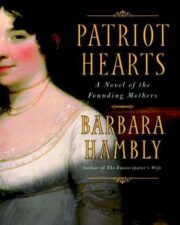Albemarle County, Virginia
Sunday, June 1, 1800
I think she’s resting easier.” Sally wrung out the rag with hands aching from the action repeated most of the night, then laid the cloth over tiny Mollie’s brow. Mollie’s mother Jenny watched her anxiously, a sturdily built young woman with round Ibo features: A decade younger than Sally, she looked a decade older, from hard work and childbearing.
“Is it scarlet fever?”
Sally nodded. “See how she’s scratching at herself? Tomorrow she’ll be out in a rash.” After almost three years, Sally could speak of the symptoms dispassionately. “I’ll tell them up at the Big House.” She nodded toward the pallet in the corner where her friend’s older children, aged five and three, watched the activity around the family’s communal bed with solemn eyes. “Mr. Jefferson’s gonna ask you to keep them separate from the other children, but myself, I think it’s too late. They’re all gonna be down with it. He’ll send Aunty Isabel to come look after Mollie when it gets light.”
Jenny nodded, and whispered her thanks. With haying starting there was no chance she’d be released to stay with her children, and her husband had been hired off down to Charlottesville to do carpentry. Both women knew the old nurse could be trusted to look after the sick baby as if Mollie were her own.
Scarlet fever. Sally’s jaw tightened at the recollection as she stepped from the cabin’s dim glow into the chilly dark outside. It had been two and a half years since the death of her daughter from the disease. It still felt like yesterday.
She stopped in the blackness among the trees, fighting tears as she always did when tiny Harriet’s face returned to her mind, and that saved her. The next instant she heard a man whisper, “That you?” and from the shadows another reply, “ ’s me.”
And Sally froze. She saw the flickers of tiny flame—burning sticks of pitch-pine that were the candles of the poor—coming from half a dozen directions.
The chestnut trees were a meeting-point because they stood on the back-side of the mountain, out of sight of the Big House but close to the slave-cabins that dotted the wooded slope. Mostly it was lovers who’d meet there, or children out on midnight expeditions to charm away warts or hunt for buried treasure. The trees were a part of the complex geography of trails and landmarks invisible to the whites, even to Tom, who was sharper than most at woodcraft. They were also the meeting-point for the kind of illicit trade that went on at every plantation, where backwoods traders would creep close to exchange rum or bird-shot or fish-hooks for such small items as could be “lifted” from the laundry or the pantry: cured tobacco-leaves, iron from the nail-factory, one of the master’s fine linen shirts. Her brother Jimmy had excelled at this: Jefferson property appropriating Jefferson property.
For an instant, seeing the tiny flames assembling by the trees, Sally wondered if Jimmy had come back. If, for all his great talk of seeking his fortune in Europe, after four years of freedom he’d come down to this: being a trader in pilfered goods.
The next instant she knew it couldn’t be so. There were too many assembling, for it to be merely a secret transaction.
A preacher?
But if a preacher had been expected, Sally knew she, or her mother, would have been told. And a preacher would have come earlier in the evening, not in this dead hour between midnight and cockcrow.
The voices were too quiet, the rhythm wrong. A single voice would murmur, barely audible under the rattle of june-beetles and cicadas in the trees. Then men would reply, and fall quickly silent. And that single voice would go on.
Sally stood like a startled animal, invisible within the shadows, until the men dispersed. Then she remained where she’d been, concealed in the thickets until she was sure every one of those men was safely in his cabin again, and not likely to see her slipping through the trees. And when she moved on, she was trembling.
She didn’t know what was going on, but she had her suspicions. And those suspicions kept her lying awake in her cabin, listening to the soft breathing of her two sleeping sons, until every bird upon the mountain started up their morning song, and the sky grew light.
When she heard the voices of the carpenters on the way up to the Big House, Sally rose and waked Young Tom. The boy was beginning his apprenticeship to David in the plantation carpentry shop. He had his father’s manual deftness, and a young man riding into some small settlement in western New York or Pennsylvania with a carpenter’s skills would always be able to make a living. Both Young Tom and his two-year-old brother Beverly had the fair skin and Caucasian features that would let them pass easily for white, no questions asked.


"Patriot Hearts: A Novel of the Founding Mothers" отзывы
Отзывы читателей о книге "Patriot Hearts: A Novel of the Founding Mothers". Читайте комментарии и мнения людей о произведении.
Понравилась книга? Поделитесь впечатлениями - оставьте Ваш отзыв и расскажите о книге "Patriot Hearts: A Novel of the Founding Mothers" друзьям в соцсетях.